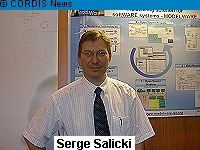FP6 project aims to increase EU competitiveness in software systems development
In an interview with CORDIS News, Serge Salicki from Thales Research and Technology, explained why the European Commission is providing 11 million euro to a Sixth Framework Programme (FP6) project addressing software system development productivity and next generation software system engineering methods and tools. System and software engineering is vital for the European economy since the efficiency and competitiveness of practically all economic sectors depends upon high quality software systems, Mr Salicki told CORDIS News. As he explained, Europe is faced with the double expectation from end-users of better, more complex and more reliable software systems, developed in an increasingly shorter time span at reduced costs. 'Europe needs to respond to these higher expectations in order to maintain its first rate ranking in the development of complex mission-critical software systems,' said Mr Salicki. The MODELWARE project (Modelling solution for software systems), coordinated by French company Thales Research & Technology, brings together 19 partners from Europe and Israel. Its three main objectives are to develop a solution to reduce the cost of software systems while increasing their productivity by 25 per cent; to lead the commercialisation of the solution; and to ensure the adoption of that solution by the industry. 'We, the partners, decided it was time to find a new solution to reduce the costs of products, especially in view of the competition from the US and Japan,' said Mr Salicki. 'In order to find a global solution to build a system of systems, we needed to cooperate since nothing of the sort exists at present.' 'We will provide tooling, processes and standards and validate them through industrial cases provided by the major partners,' added Mr Salicki. 'For example, Thales will aim to build a new air traffic control centre or a naval seismic detection system while France Telecom will look into building a new voice communication system.' The two-year project, started in August 2004, has now launched its first common project, Eclipse Model Driven Development integration (MDDi), to elaborate a standard for software development. As Mr Salicki told CORDIS News, this is an ambitious project but everything is going according to plan, with the partners not foreseeing any problems or difficulties in the future. 'Within two to three years we should be able to provide a modelling tool in open source to provide an integrated tool chain to help system engineers build new softwares,' said Mr Salicki. As software development moves from being code and document-centric to becoming model-centric, so engineers have to be taught this process. For this reason, the MODELWARE consortium also includes universities. 'Modellisation is not just a problem of tooling, it is also a problem of education. Europe needs good teachers and needs to offer courses at university level. This is why we are working with European universities to offer new courses in modellisation,' concluded Mr Salicki.



